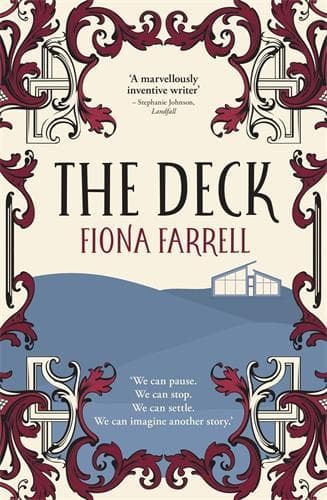Review: The Deck
Reviewed by Siobhan Harvey
Recently a competition judge criticised entries about the Covid pandemic as being written too soon to confront this most confronting of subjects. Everyone, of course, is welcome to their opinion but, in this case, I humbly disagree. Writing should tackle our most pressing problems, and the fears, dilemmas and hardships they produce, and it should do so in the moment or as soon as possible thereafter.
Clearly, in believing this, I’m not alone. For, as we continue to grapple with the ongoing challenges of our Covid-hardened world, along comes The Deck, the first literary novel in six years by award-winning Banks Peninsula author Fiona Farrell. It’s a resonant, multitextured story about a group of friends locked down during a pandemic who keep one another entertained by telling tales. In this, The Deck offers readers and writers a timely and vivid reminder of why we need to confront our contemporary challenges, the better to process and understand them, and therein heal.
On one level, this is an eminently relatable read. A group of friends – Philippa, Didi, Ani, Tom, Pete, Baz - escape the city to avoid a pandemic lockdown, holing up in a rural bach called The Crib. The hermetically sealed existence they face feels authentic. At first, life seems free. Surrounded by Nature’s wonders, they have all the time they want to walk, sing, eat and talk. In fact, they exhaust every subject: lost friends; local history and politics; best old movies; philosophies proposed by Chomsky, Friedan and Greer; musical icons, Dylan, Lennon …
Then, debate turns personal then melancholic, wherein these seemingly sophisticated people must face down themselves, their interiorities and inner demons. In this, Farrell’s Kiwiana detail is on point: SUVs; suburbia and second homes; Under the Volcano; Mansfield versus Frame; palates devoted to camembert and olives, but equally not adverse to Tim Tams. Ditto, the complex mix of lockdown-enforced emotions: egotism; envy; self-deprecation; vulnerability; the craving for escape; the craving for all of this to end and for life to return to normal, whatever that is.
To this relatability, Farrell adds a richly layered subtext. She extensively borrows her motifs from Giovanni Boccaccio’s 14th Century epic, The Decameron. Consequently, Boccaccio’s focus upon wealthy vicenarians fleeing Florence during the plague in favour of a luxurious villa is transposed to middle-class Aotearoa.
The Deck also pays homage to The Decameron’s theme of artistic diversion progressed by its characters passing the time in storytelling, singing and communing with nature.
Farrell engages with these matters both literally and figuratively. The characters’ relationships with the environment, for instance, is evident in both an evocation of the surroundings they escape to, and in their confessions of their pasts. In the latter too, as with Boccaccio’s, Farrell’s characters spin such yarns to entertain their companions and, in doing so, begin to blur the lines between real life and fiction, autobiography and invention.
Other thematic elements ensue. For the symbolism prevalent in The Decameron becomes one deployed in The Deck too. The former asks its reader what is the relationship between art and life, and how can one (narrative) help us overcome the most perilous aspects of the other (existence)? In The Deck, Farrell contemporises and localises these provocations. The unreliability of self and survival; the interconnectedness between reality and creativity; the construction of our beings versus the composition of story: these complexities are confronted from the first pages of the book. Here we’re introduced, not to a cast of characters and their problems, but to ‘the novelist’ who informs us they’ve recently read “two small volumes, hardback” of The Decameron and while, contemplating the 1918 Influenza outbreak’s decimation of South Pacific populations and the leadership of “the gifted and remarkable, Jacinda, Joan of Arc who leads it all from the front,” is searching for inspiration for a new book. A deeply faceted and deeply-mulled literary novel, The Deck is a relevant, expansive read.
Reviewed by Siobhan Harvey
